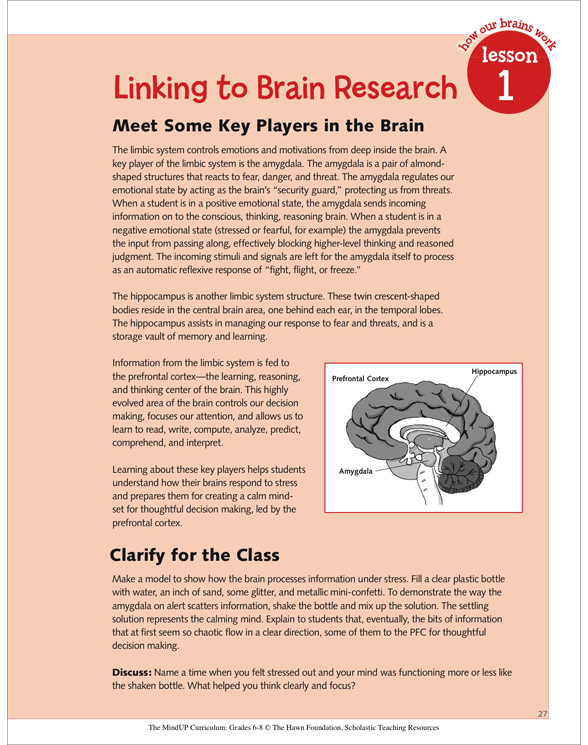

- MINDUP CURRICULUM BENEFITS HOW TO
- MINDUP CURRICULUM BENEFITS PROFESSIONAL
- MINDUP CURRICULUM BENEFITS SERIES

These individuals wanted to begin incorporating social and cultural aspects. In 1970 the focus of curriculum studies shifted again due to the belief of young activist. It was originally created to be able to manage "the transition of the American secondary school from an elite preparatory school to a mass terminal secondary school" until the 1950s when "a preparation for college" became a larger concern. What does it mean to be an educated person? Ĭurriculum studies was created in 1930 and known as the first subdivision of the American Educational Research Association.Why should it be taught? To whom should it be taught?.Specific questions related to curriculum studies Its proponents investigate the relationship between curriculum theory and educational practice in addition to the relationship between school programs, the contours of the society, and the culture in which schools are located. Schooling and the Struggle for Public LifeĬurriculum studies is a concentration in the different types of curriculum and instruction concerned with understanding curricula as an active force influenced by human educational experiences.( March 2023) ( Learn how and when to remove this template message) Please help to improve this article by introducing more precise citations. Coaching and mentorship sessions, which includes one-on-one support from a MindUP training consultant.This article includes a list of general references, but it lacks sufficient corresponding inline citations.
MINDUP CURRICULUM BENEFITS PROFESSIONAL
Online platform membership, through which trainers receive professional learning opportunities, access to a training community to ask questions and resources to support implementation.Ģ. Supporting resources or materials available with programġ. Assignments for assessment (2 to 3 hours). Synchronous virtual training (6 hours), which includes 5 sessions that vary between 60 to 90 minutes. Pre-work (5 hours), which includes reading and completing online training. There are 3 elements to the train-the-trainer program: 1. We also ask for the educators to practice daily skills, such as completing brain breaks with their students. There are 17 lessons that each take approximately 30 to 45 minutes. There are additional training and mentorship programs to support adult self-care and communities of practice.Ģ.

This requires a minimum of 5 hours of training that can be completed asynchronously or synchronously. There are 2 elements to the MindUP program:ġ. Topics include building community, understanding the brain, learning to be mindful, mindful senses (listening, seeing, smelling, tasting, touch and movement), exploring feelings, perspective-taking, empathy, optimism, gratitude, kindness, and mindful actions in our community.
MINDUP CURRICULUM BENEFITS SERIES
The MindUp curriculum is a series of 17 lessons which work together. The Personal and Social Capabilities from the Australian Curriculum are mapped to the CASEL competencies, and each of the MindUP lessons maps against each of the Personal and Social Capabilities. The program uses the evidence-based CASEL competencies, which include social awareness, responsible decision making, relationship skills, self-management and self-awareness.

MindUP used the four pillars of neuroscience, positive psychology, mindful awareness and social and emotional learning.
MINDUP CURRICULUM BENEFITS HOW TO
MindUP teaches children and young people how to focus their attention, use brain breaks to manage stress, act with empathy and build resilience in the face of challenge. The MIndUP curriculum builds awareness and skills to increase prosocial behavior, executive functioning and social and emotional competence in children and young people from ages 3 to 14. MindUP’s program is an evidence-based social and emotional learning program grounded in neuroscience.


 0 kommentar(er)
0 kommentar(er)
